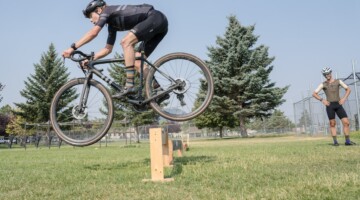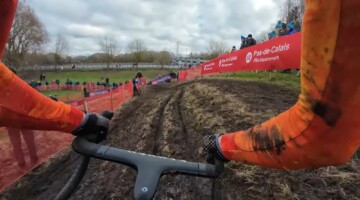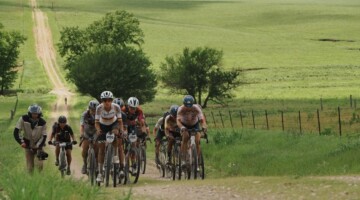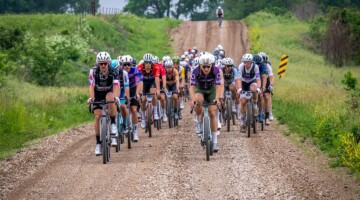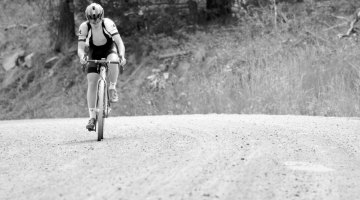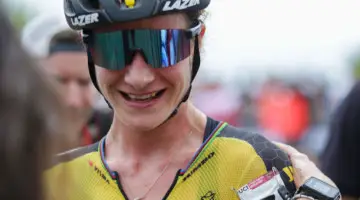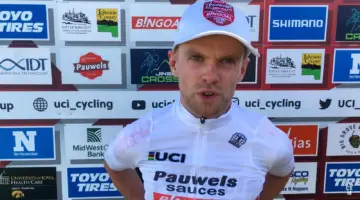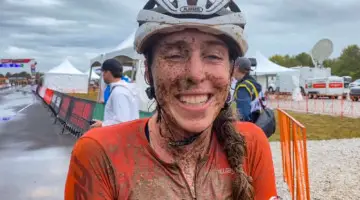Update: Listen to full audio of my conversation with Mat Stephens
Although maybe not a household name for cyclocross riders, Mat Stephens of Dallas, TX is quickly becoming a star in the gravel world. Stephens kicked off his 2017 gravel campaign with a victory over Lance Armstrong at the Texas Chainring Massacre (yes, that Lance Armstrong) and added a win at the Barry Roubaix before kicking off a meaty road campaign with his Arapahoe Resources / Garneau team.
Earlier this month, Stephens added a title at the Dirty Kanza 200 to his palmares after surging away from tough challenges by Jake Wells and Menso de Jong.
Cyclocross Magazine recently got the opportunity to talk to Stephens while he was en route from the North Star GP in Minneapolis to this weekend’s U.S. Pro Road Race Nationals in Knoxville, TN. Read on to hear Stephens’ take on the DK200 race, the benefits of aero bars in gravel racing, and which race he would like to win to get the 2017 Gravel Triple Crown.
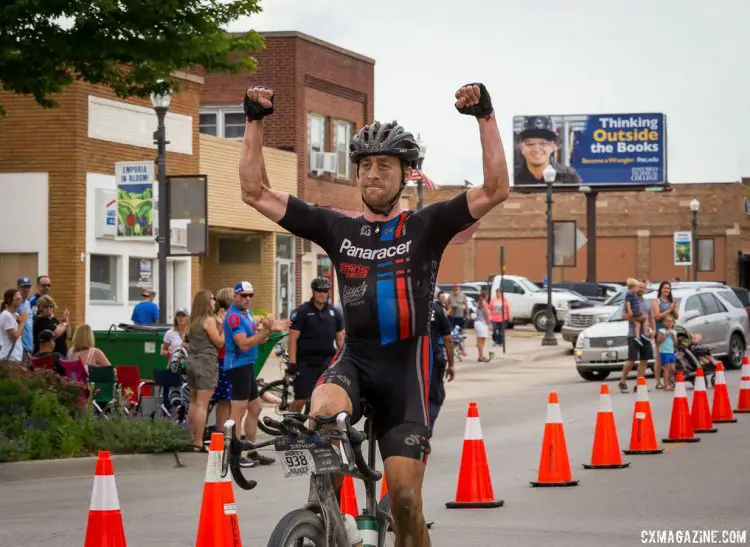
Mat Stephens reigned as the King of the Kansas countryside at the 2017 Dirty Kanza 200. © Christopher Nichols
Excerpts of Cyclocross Magazine’s Discussion with Mat Stephens
Cyclocross Magazine: You’ve obviously been doing a full road schedule, but I was looking and you won Barry Roubaix, I believe, and now you won Dirty Kanza. Are you starting to think of yourself as a gravel specialist?
Mat Stephens: I won Texas Chainring Massacre also. And my teammate and I went one-two at Land Run. I knew I had good endurance. Training with other pros or Cat 1s, I’ve kind of realized more and more that I have really good endurance. I always liked harder races on the road, but it’s never really been on my radar, and there’s never been such hype around it until the last couple of the years. More and more you’ve been hearing about gravel races and more events in general. We’ll see where it takes me, for sure.
CXM: I think cyclocross racers like to joke about roadies and their questionable bike-handling skills at times. Have you been doing work to get comfortable on the gravel, or do you have a background in mountain biking or something like that?
MS: That was a pet peeve. I actually hear that a lot during gravel races, and I heard it at DK. It was like somebody blah blah blah roadie, and I just want to turn around and say “If we’re on the gravel bike, I’m a gravel rider right now.” We’ve all got our own strengths and weaknesses, and you know, we’re all age category or whatever, so we’re all signed up for the same race, we just have different strengths and weaknesses.
I’ve been racing ’cross off and on, not seriously until the past three or four years, so I’ve hit up some races. I went to Austin and did singlespeed nationals. I’ve been doing UCI races in Texas and Oklahoma the last few years as well. Not getting great results or anything, but I have definitely worked on my skills and being efficient. When I’m on the course with other ’cross racers, I’m not going to drop those guys in the turns, but compared to somebody’s skills who are lacking on gravel, technical descents or just going through a turn, having that skill set definitely is another advantage out on course.
CXM: It sounds like that critique might be unfair for you. Given you’ve done some cyclocross and you did pretty well at Dirty Kanza.
MS: I try to be a good bike rider. I prep for the next race I’m going to, for the next part of the year, whether it’s ’cross season or mountain bike or road, you just race what’s in front of you and try to be a good bike racer and not pigeon hole yourself into anything. Whether it’s nutrition or endurance or handling skills, it takes it all to get on the podium. So I try to enhance myself in every area.
CXM: How was the Dirty Kanza in terms of how the race played out? How was it similar to or different from the typical road race?
MS: For sure the distance, I mean, that distance was unknown, at least for me. I didn’t really know how that would play out. As far as comparing it to other road races, it’s never really like there’s one decisive move in the race. And there’s never one hill or one climb or anything like that. It’s an accumulation of the whole course, for the most part. You don’t really see a lot of solo breaks where guys work together and bring it back, or anything like that. It’s definitely a war of attrition and you just make these small moves that add up to winning the race. Never like one major move or one decisive moment for the whole race like you would see on a road circuit or something.
CXM: I talked to Jake Wells the other day and he said you were riding very strong, and he identified you as someone to watch out for. You guys ended up in a three-man group, and he said at some point though you did have a little bit of a surge that put a gap on the other guys. Is that kind of what happened?
MS: Yeah, for sure. Jake was definitely the other guy in the group who I had my eye on as well. But Menso [de Jong], Jake, and I were some of the strongest in the group. A few different times, whether it was a hill, Texaco Hill was kind of the first major one to kind of separate out the group. Then eventually we had 11 at Checkpoint Two.
I felt well and would just kind of ride my own pace up the harder climbs. I knew if I felt comfortable at my pace, the weaker guys would be struggling and those efforts would add up over the day. But finally around Mile 120 or something like that the group of 10, actually at that point, was less cohesive and not everybody was sharing the load anymore. We had a pretty good rotation going for, honestly, 40 miles, which sounds like forever, and it is. You kind of just get in a rhythm.
Around there it started kind of breaking down. I think we had gone through a series of hills and guys were starting to feel pretty fatigued. I knew I wanted to make everyone contribute and not have someone slip away or have someone sit on the back for too long and kind of come around. One hill I rode into it and then just accelerated more and more until we got four guys, total, together, and then once we got over the top I pinned it pretty good to make sure that was the final selection. And then we ended up dropping one guy a few miles later, and Jake, Menso, and I were the final three from then on. That was probably with 75 miles to go.
CXM: Just a little spin around the Kansas countryside.
MS: Another quick 75, yeah.
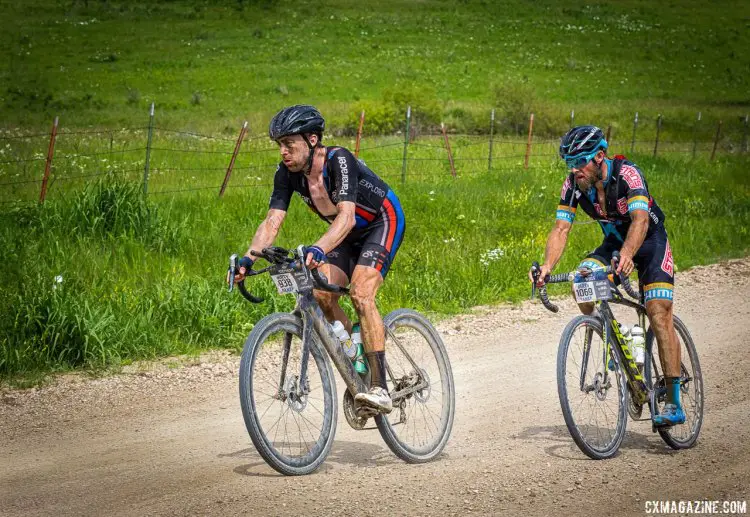
Mat Stephens had a tough last 75 miles racing against Jake Wells. 2017 Dirty Kanza gravel race. © Christopher Nichols
CXM: Did you do any special, specific training. Do you do any specific training for the gravel events?
MS: For sure. In the early season, before road season gets going say, February maybe March, I do a lot those big rides and endurance rides to prep for the gravel events and really work on my endurance. Once the road racing season hits, I’ve done Joe Martin, Gila, Redlands, Sunny King, a couple more, once that stuff hits I don’t really have the weekends or the energy to be going on long, endurance rides anymore. Or long gravel rides. I really have to rely on that early-season work, and just gain some great fitness through these stage races and intense road races leading up to events.
I’ve been doing some bike packing this year. Sleeping in hotels and at friends’ houses. Traveling point-to-point rides and stuff like that. One trip was from Dallas to College Station and back over four days, and one was west of town to Witchita Falls and one day to my grandma’s house and one day home. Just rides like that, I’d ride a bunch of gravel, I’ve ridden gravel for a long time, just to get a feel for the bike and long days in the saddle. But leading up to the race it’s usually just a lot of intensity from road racing or criterium racing.
CXM: Another thing we’re obviously interested in is you decided to go with aero bars. Can you tell me about that decision? Did it come from previous experience doing gravel events?
MS:: I had not used aero bars before this year. They looked like a good idea, but I just never really had the need, I’ve just done local stuff, so the racing wasn’t as competitive as some of these national races. It was an easy decision. I mean we’re averaging a moving speed of about 20 miles per hour, so of course it’s advantageous. And that’s with the hills and wind. I feel sorry for the guys who aren’t using aero bars. It’s not even fair, honestly. I raced against Lance Armstrong this year and he didn’t have aero bars, and he was pretty jealous of mine when the wind was blowing 15,20 miles an hour. It’s a huge advantage.
Some courses don’t allow them. Barry Roubaix didn’t allow aero bars. Most of them don’t really mind. They’ll let you run whatever. It’s generally more comfortable if you set them up right. Of course on the technical parts you’re on the drops or hoods. Racing in a pack on the road, I’m comfortable riding the aero bars as well. In a crosswind you’ve only got one groove to ride in. Even if you’re pace lining or trying to get a draft from the guy in front of you, you’re really getting hit with the side wind anyway, so having the aero bars in those situations is huge too.
CXM: Let’s say you created a Triple Crown of gravel events, since you’ve done so many, which would you want to win in a given year?
MS: Somebody, I’m new to all this so I just hear what other people tell me, but they tell me the triple crown is DK, Gravel Worlds and Trans Iowa. But, I mean, I have a hard time believing Trans Iowa is a gravel race. It’s hard when you have limited entries to have a fair, open competition, for one. And then it’s a race that goes beyond my waking hours, you know. So I don’t know if I would include Trans Iowa.
The cool thing about Barry Roubaix is it’s the largest one, right? The largest gravel race. [With] DK the cool part is it’s the one that’s been around for a while that is very tough, very long. I haven’t done Gravel Worlds yet. I will this year. It seems like it’s a good intermediate, like 150-mile length. I would like to pick an event that’s like 100 miles that’s really tough. The reason I don’t like Barry Roubaix is it’s only 100K. It’s really cool, it’s really fast, it has great roads, and it’s really huge. But it’s only 100K. I mean we did it in like three hours, so it’s not really long. But for right now I think it would be Gravel Worlds, Barry Roubaix and DK, based on the length and the notoriety at this point.
Listen to full audio of my conversation with Mat Stephens
Although the focus of the gravel world is not in Kansas anymore, you can click your heels together three times and click on the links below to go back to our other 2017 Dirty Kanza conversations:

